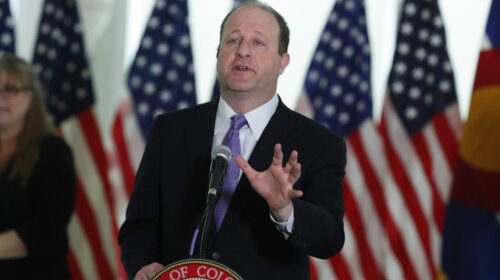DENVER (AP) — A major meatpacking plant in Colorado will be closed indefinitely while its owner, JBS USA, the state and the federal government arrange an aggressive coronavirus testing campaign for its 5,000 workers, Gov. Jared Polis said Monday.
Polis said he spoke to Vice President Mike Pence over the weekend and on Monday to arrange getting testing kits to the plant in Greeley, which announced Friday it was closing after at least two workers died of the virus.
The plant’s employees are in quarantine while a testing plan is being devised, and JBS plans to disinfect the facility before returning to full operations, Polis said. The National Guard will help with the testing, he said.
The plant will be closed “for as long as it takes,” Polis said. “Whether that’s two days or two weeks, that’s what we’re going to do.”
“Our priority is to restore this critical part of our national food security,” the governor said.
JBS didn’t immediately return telephone calls and emails seeking comment Monday.
Polis said “two or three” JBS workers have died of the virus, and a union representing 3,000 plant workers has said that at least 42 workers had tested positive.
JBS USA had said Friday that it would close the plant through Tuesday for deep cleaning and to screen workers — even though it was Easter weekend and a plant holiday Monday for unionized workers.
CEO Andre Nogueira said the company was paying more than $1 million for thousands of testing kits for workers at the plant. He said 36 employees had tested positive for the disease.
Health authorities in Weld County, where the plant is located, cited the close proximity of workers to each other and employees working while they were sick and warned last week it could order the plant shut down.
JBS USA is a subsidiary of Brazil-based JBS S.A., one of the world’s largest meat processors, and holds a majority interest in Pilgrim’s Pride, the United States’ second largest poultry company. It processes beef at the Greeley plant.
For most people, the new coronavirus causes mild or moderate symptoms, such as fever and cough that clear up in two to three weeks. For some, especially older adults and people with existing health problems, it can cause more severe illness, including pneumonia, and death.

